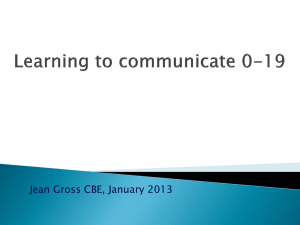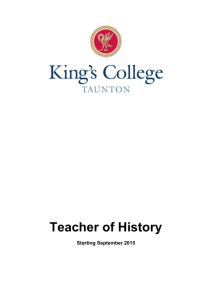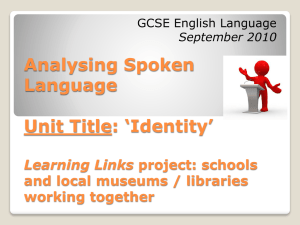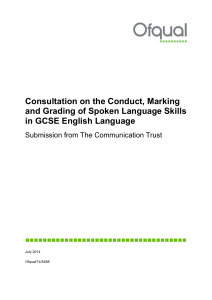Pat Glass MP - The Communication Trust
advertisement
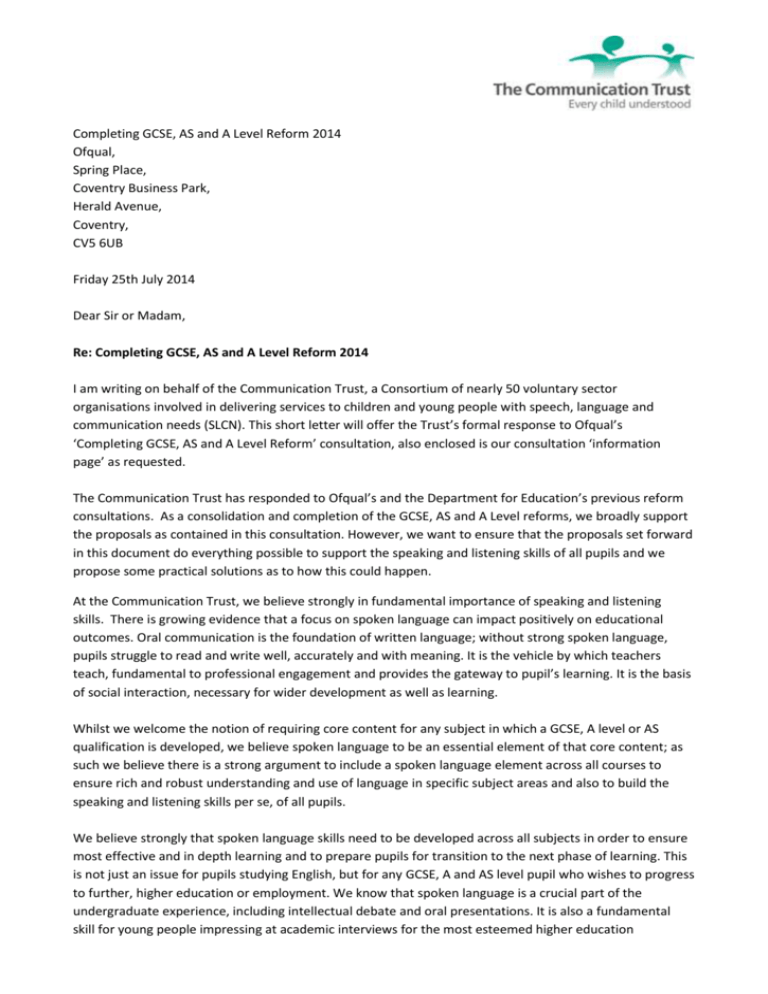
Completing GCSE, AS and A Level Reform 2014 Ofqual, Spring Place, Coventry Business Park, Herald Avenue, Coventry, CV5 6UB Friday 25th July 2014 Dear Sir or Madam, Re: Completing GCSE, AS and A Level Reform 2014 I am writing on behalf of the Communication Trust, a Consortium of nearly 50 voluntary sector organisations involved in delivering services to children and young people with speech, language and communication needs (SLCN). This short letter will offer the Trust’s formal response to Ofqual’s ‘Completing GCSE, AS and A Level Reform’ consultation, also enclosed is our consultation ‘information page’ as requested. The Communication Trust has responded to Ofqual’s and the Department for Education’s previous reform consultations. As a consolidation and completion of the GCSE, AS and A Level reforms, we broadly support the proposals as contained in this consultation. However, we want to ensure that the proposals set forward in this document do everything possible to support the speaking and listening skills of all pupils and we propose some practical solutions as to how this could happen. At the Communication Trust, we believe strongly in fundamental importance of speaking and listening skills. There is growing evidence that a focus on spoken language can impact positively on educational outcomes. Oral communication is the foundation of written language; without strong spoken language, pupils struggle to read and write well, accurately and with meaning. It is the vehicle by which teachers teach, fundamental to professional engagement and provides the gateway to pupil’s learning. It is the basis of social interaction, necessary for wider development as well as learning. Whilst we welcome the notion of requiring core content for any subject in which a GCSE, A level or AS qualification is developed, we believe spoken language to be an essential element of that core content; as such we believe there is a strong argument to include a spoken language element across all courses to ensure rich and robust understanding and use of language in specific subject areas and also to build the speaking and listening skills per se, of all pupils. We believe strongly that spoken language skills need to be developed across all subjects in order to ensure most effective and in depth learning and to prepare pupils for transition to the next phase of learning. This is not just an issue for pupils studying English, but for any GCSE, A and AS level pupil who wishes to progress to further, higher education or employment. We know that spoken language is a crucial part of the undergraduate experience, including intellectual debate and oral presentations. It is also a fundamental skill for young people impressing at academic interviews for the most esteemed higher education institutions, which is particularly important in the Governments’ mission to improve social mobility for those pupils from more deprived backgrounds. Oral communication is a skill that is also becoming increasingly important to employers; a survey from the Institute of Directors revealed that businesses suffering skills shortages named communication skills as one of the most difficult skills to obtain, with 22% and 18% of businesses experiencing difficulties in recruiting people with adequate oral and written communication skills respectively. In addition to those typically developing pupils, there are a large number of students with poor language skills, either due to an impairment or due to environmental factors. The gap between attainment in children with an identified Speech, Language and Communication Need (SLCN) and their peers is unacceptably high and this gap has widened since 2008 by 7% from 49% to56%. Department for Education statistics also show that pupils with most other SEN achieve more highly than pupils with SLCN. A better understanding on behalf of teachers in spoken language and how to scaffold these skills in all pupils would, we believe, support this gap to narrow rather than continue to widen. This could be supported by careful development and assessment of these skills across GCSEs, AS and A levels. There are often arguments around the complexity of spoken language and the difficulties inherent in measuring and tracking progress in these important skills. However, language has a specific and predictable developmental pattern for those children and young people with typical development. To support teachers to understand this progression, the Trust has developed a framework of age appropriate expectations for language, highlighting key developmental markers for specific components of language as follows; spoken language and verbal reasoning, vocabulary, sentence structure and narrative and social interaction skills for ages 11-18. Importantly, we also have suggestions on robust assessment models; we have been in dialogue with the English Speaking Board about GCSE assessment of speaking and listening. We would be delighted to work with Ofqual to refine this model to create a standardised spoken language element for the core content proposal. We would be delighted to discuss this idea further with you. We are also keen to pursue our solutions for finding more robust ways to assess speaking and listening in GCSE English and English language so that these elements can again count towards final grades; we have written several times to Glenys Stacey as you will know. We are delighted that Julie Swan is able to attend our Communication Consortium meeting on 23rd September to as part of your consultation on the Conduct, Marking and Grading of Spoken Language Skills in GCSE English Language and we look forward to continuing the discussion. Kind regards, Anne Fox Director


